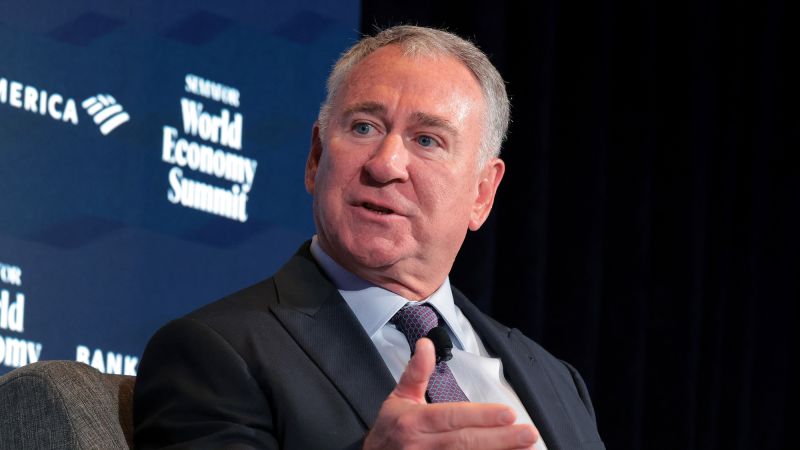Ken Griffin, the CEO of Citadel and a prominent billionaire known for his affiliation with President Donald Trump and his significant financial contributions to Republican candidates, has recently expressed strong criticism of Trump’s trade war. He stated that the ongoing trade conflict is detrimental to the United States’ global reputation and is effectively degrading its brand on the international stage.
During his remarks at the Semafor World Economy Summit held in Washington, Griffin articulated his views, emphasizing that the United States embodies more than just a geographical entity; it represents a universal brand revered worldwide. He elaborated, noting that this brand encompasses a diverse array of elements, including American culture, economic prowess, and military might. Griffin lamented that America’s status has shifted from being a beacon of aspiration to a state of vulnerability, suggesting that the current trade policies could be damaging the prestige that the country holds globally.
As the founder of one of the largest hedge funds globally, Griffin pointed out a rising concern among traders about the safety of investing in the United States, particularly in regards to U.S. Treasury bonds. He highlighted that Trump’s protective tariffs have cast doubt on America’s reliability and rationality within the global financial marketplace. The apprehension comes from a growing belief that the U.S. might jeopardize not only its economy but also its reputation on the world stage.
In comparing commodities purchased by consumers, Griffin emphasized how brand trust influences buying decisions. He stated, “In the financial markets, no brand compares to the brand of the U.S. Treasuries,” reaffirming the historical standing of these bonds as safe-haven investments. Treasuries have long been considered the gold standard, backed by the United States Government’s full faith and credit. During periods of economic turmoil, investors traditionally seek shelter in these bonds, foregoing riskier ventures, especially during significant market downturns.
However, in light of the escalating trade war and its implications, there has been a noticeable shift in investor behavior. As fears surrounding potential damage to both the global and U.S. economies grow, market participants are increasingly wary of the risks associated with U.S. assets. Griffin’s concerns resonate with similar sentiments expressed by Jamie Dimon, the CEO of JPMorgan Chase, who highlighted the unique standing of America in his recent shareholder letter. Dimon indicated that America’s economic, military, and moral strength could be undermined by policies driven solely by an “America First” doctrine, warning that fragmentation of alliances could lead to America’s gradual degradation over time.
Moreover, Griffin drew a parallel between America’s brand and well-known luxury labels; he articulated that, like a prestigious handbag or a high-quality automobile, any scandal or negative perception could irreparably damage a brand’s reputation. Griffin warned, “It can take a very long time — a very long time — to remove the tarnish on a brand.” Such losses are not easily repaired, engendering lasting consequences for public perception and trust.
The recent downturn in U.S. financial markets and the purchasing power of the American dollar illustrates these concerns. The dollar recently reached its lowest value in three years amidst fears of a looming recession, while U.S. crude oil prices plummeted as well. Treasury yields have surged, reflecting a disturbance in typical market behavior. Griffin pointed out that these trends showcase the urgent need for Trump and his economic advisers to address the fallout from their trade policies convincingly.
He reiterated the importance of responsible brand management, especially for leaders like the president and key economic secretaries, urging them to act with thoughtfulness and integrity regarding America’s brand. “When you tarnish that brand, it can be a lifetime to repair the damage that has been done,” Griffin concluded, echoing a sentiment that resonates deeply in today’s interconnected economic landscape.



